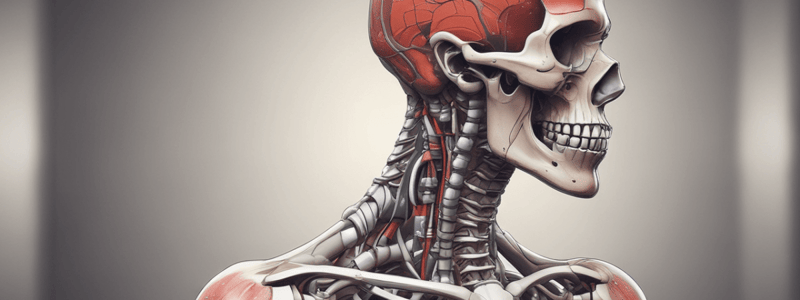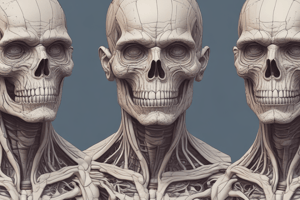Podcast
Questions and Answers
What does anatomy primarily focus on?
What does anatomy primarily focus on?
- The chemical processes within and relating to living organisms
- The study of the function of body parts and the body as a whole
- The study of the immune system and its disorders
- The study of the structure and relationship between body parts (correct)
Which field studies the function of body parts?
Which field studies the function of body parts?
- Histology
- Anatomy
- Physiology (correct)
- Pathology
Which of the following best describes physiology?
Which of the following best describes physiology?
- The study of the function of body parts and the body as a whole (correct)
- The study of tissues and their structures
- The study of disease processes in the body
- The study of the structure and relationship between body parts
Which statement correctly differentiates anatomy and physiology?
Which statement correctly differentiates anatomy and physiology?
Which of the following would be an example of a physiological study?
Which of the following would be an example of a physiological study?
Which of the following is NOT one of the 11 important organ systems in the human body?
Which of the following is NOT one of the 11 important organ systems in the human body?
Which system is responsible for the body's movement?
Which system is responsible for the body's movement?
What is the primary role of the endocrine system?
What is the primary role of the endocrine system?
Which system works closely with the skeletal system to facilitate movement?
Which system works closely with the skeletal system to facilitate movement?
Which system's primary function includes the removal of waste products from the body?
Which system's primary function includes the removal of waste products from the body?
Which system is responsible for circulating blood and maintaining body temperature?
Which system is responsible for circulating blood and maintaining body temperature?
Which parts are primarily involved in the digestive and excretory systems?
Which parts are primarily involved in the digestive and excretory systems?
What is the primary function of the endocrine system?
What is the primary function of the endocrine system?
Which system includes skin, hair, nails, and other exocrine glands?
Which system includes skin, hair, nails, and other exocrine glands?
What is the clear fluid called that is transported by the lymphatic system?
What is the clear fluid called that is transported by the lymphatic system?
Which vessel carries oxygenated blood from the lungs to the heart?
Which vessel carries oxygenated blood from the lungs to the heart?
What is the main artery that supplies oxygenated blood to the body?
What is the main artery that supplies oxygenated blood to the body?
Which vessel is responsible for returning deoxygenated blood from the lower body back to the heart?
Which vessel is responsible for returning deoxygenated blood from the lower body back to the heart?
Which artery is found in the thigh and supplies blood to the lower body?
Which artery is found in the thigh and supplies blood to the lower body?
What role do the pulmonary arteries play in the circulatory system?
What role do the pulmonary arteries play in the circulatory system?
Which vessel carries oxygenated blood from the lungs to the heart?
Which vessel carries oxygenated blood from the lungs to the heart?
Where does black blood originate in the circulation system?
Where does black blood originate in the circulation system?
What is the main function of the capillaries of peripheral tissues?
What is the main function of the capillaries of peripheral tissues?
What follows the left atrium in the sequence of blood circulation?
What follows the left atrium in the sequence of blood circulation?
Which structure directly receives blood from the postcava?
Which structure directly receives blood from the postcava?
Which layer of the skin is responsible for containing most sensory nerves?
Which layer of the skin is responsible for containing most sensory nerves?
What is the primary function of hair in the integumentary system?
What is the primary function of hair in the integumentary system?
Which component of the integumentary system releases oils for moisture and protection?
Which component of the integumentary system releases oils for moisture and protection?
What role do nails play in the integumentary system?
What role do nails play in the integumentary system?
Which structure sends and receives messages to the brain in the integumentary system?
Which structure sends and receives messages to the brain in the integumentary system?
Which part of the digestive system immediately follows the stomach?
Which part of the digestive system immediately follows the stomach?
What is the correct order of the sections of the small intestine?
What is the correct order of the sections of the small intestine?
Which organ is responsible for producing bile?
Which organ is responsible for producing bile?
Where does the food go after it passes through the ileum?
Where does the food go after it passes through the ileum?
Which part of the digestive system connects the oral cavity to the esophagus?
Which part of the digestive system connects the oral cavity to the esophagus?
Which of the following is responsible for producing white blood cells in the immune system?
Which of the following is responsible for producing white blood cells in the immune system?
What is the primary function of the lymph nodes in the immune system?
What is the primary function of the lymph nodes in the immune system?
Which organ is directly involved in the maturation of T-lymphocytes (T-cells) in the immune system?
Which organ is directly involved in the maturation of T-lymphocytes (T-cells) in the immune system?
Which of these structures primarily acts as a physical barrier to pathogens?
Which of these structures primarily acts as a physical barrier to pathogens?
Where is lymphatic fluid transported within the immune system?
Where is lymphatic fluid transported within the immune system?
Which gland helps regulate the level of calcium in the blood?
Which gland helps regulate the level of calcium in the blood?
Which organ secretes male sex hormones?
Which organ secretes male sex hormones?
What is the primary function of the adrenal glands?
What is the primary function of the adrenal glands?
Which gland affects metabolism?
Which gland affects metabolism?
Which hormone-secreting organ is found only in females?
Which hormone-secreting organ is found only in females?
What is the role of the pancreas in the endocrine system?
What is the role of the pancreas in the endocrine system?
Which of the following is NOT a function of the circulatory system?
Which of the following is NOT a function of the circulatory system?
Which of these components is responsible for the circulation of blood in the body?
Which of these components is responsible for the circulation of blood in the body?
What is the primary role of the circulatory system in maintaining homeostasis?
What is the primary role of the circulatory system in maintaining homeostasis?
What does the circulatory system transport to help in fighting diseases?
What does the circulatory system transport to help in fighting diseases?
Which of the following nutrients are transported by the circulatory system?
Which of the following nutrients are transported by the circulatory system?
Flashcards are hidden until you start studying
Study Notes
Anatomy
- Anatomy studies the structure and relationship between body parts
- Physiology studies the function of body parts and the body as a whole
Body Systems
- The human body has 11 important organ systems:
- Circulatory
- Respiratory
- Digestive
- Excretory
- Nervous
- Endocrine
- Immune
- Integumentary
- Skeletal
- Muscle
- Reproductive
Main Systems of the Human Body
Circulatory System
- Circulates blood around the body via the heart, arteries, and veins
- Delivers oxygen and nutrients to organs and cells
- Carries waste products away
- Keeps the body's temperature in a safe range
Digestive and Excretory Systems
- Absorbs nutrients and removes waste via the gastrointestinal tract
- Eliminates waste from the body
Endocrine System
- Influences the function of the body using hormones
Integumentary System/Exocrine System
- Includes skin, hair, nails, sweat, and other exocrine glands
Immune System and Lymphatic System
- Defends the body against pathogens
- A network of lymphatic vessels that carry a clear fluid called lymph
Circulation
- Pulmonary artery: carries deoxygenated blood from the heart to the lungs
- Pulmonary veins: carry oxygenated blood from the lungs to the heart
- Aorta: the main artery that carries oxygenated blood from the heart to the rest of the body
- Inferior vena cava: carries deoxygenated blood from the body to the heart
- Right atrium: receives deoxygenated blood from the body
- Right ventricle: pumps deoxygenated blood from the heart to the lungs
- Left atrium: receives oxygenated blood from the lungs
- Left ventricle: pumps oxygenated blood from the heart to the rest of the body
Digestive System
- Mouth: where food enters the body
- Pharynx: where food passes through
- Esophagus: where food is swallowed
- Stomach: where food is digested
- Small intestine: where nutrients are absorbed
- Large intestine: where waste is processed
- Associated organs: salivary glands, liver, gallbladder, pancreas, and appendix
Endocrine System Diagram
Male
- Hypothalamus: controls the pituitary gland
- Thyroid gland: affects metabolism
- Parathyroids: regulate calcium levels in the blood
- Testis: secretes male sex hormones
- Adrenal glands: trigger the fight-or-flight response
- Pancreas: regulates blood sugar levels
Female
- Hypothalamus: controls the pituitary gland
- Thyroid gland: affects metabolism
- Parathyroids: regulate calcium levels in the blood
- Ovary: secretes female sex hormones
- Adrenal glands: trigger the fight-or-flight response
- Pancreas: regulates blood sugar levels
Integumentary System
- Skin: consists of epidermis, dermis, and fat layers
- Hair: helps keep you warm
- Nails: provide structure to the ends of fingers
- Glands: release oils for moisture and protection
- Nerves: send and receive messages to the brain
Studying That Suits You
Use AI to generate personalized quizzes and flashcards to suit your learning preferences.




